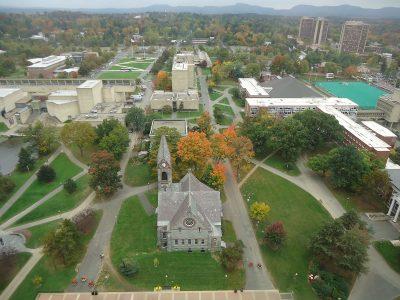The University of Massachusetts Amherst raised its campus COVID-19 risk level to “High Risk” Sunday, after a spike in cases following the return to campus last week.

The move came two days after the campus initially raised its risk level to “Elevated,” barring all student gatherings on and off campus. As of Tuesday evening, Amherst has 423 active COVID-19 cases.
In a letter to the campus community Sunday, Amherst Chancellor Kumble Subbaswamy wrote the designation would last a minimum of two weeks, and all students must remain in their residences unless they’re getting food, a twice-weekly COVID-19 test or going to a medical appointment.
“This new designation will have a significant impact on our UMass community, both on and off campus for its duration,” Subbaswamy wrote. “It will only be lifted when public health conditions improve substantially.”
Many Amherst students took to social media to credit the spike in COVID-19 numbers on two parties allegedly thrown by the Amherst’s Theta Chi fraternity chapter during the weekend of Jan. 29. The fraternity denies their occurrence.
Videos of Theta Chi parties said to have taken place Jan. 29 and 30 were posted on YouTube by The Massachusetts Daily Collegian — the campus’ student newspaper.
An online petition calling for the college to disband the fraternity has gained more than 7,000 signatures since its posting Sunday.
The University announced Monday evening it had suspended Theta Chi. The fraternity is prohibited from chapter-related functions pending an investigation by Amherst’s Student Conduct and Community Standards Office.
Jessica Giordano, a sophomore at Amherst, said she didn’t think people should be throwing parties during a pandemic.
Giordano is a member of Amherst’s Sigma Sigma Sigma sorority chapter, which has been virtual since she joined last fall. She said Greek Life has come under scrutiny since the Theta Chi parties went viral.
“While most of us are being very diligent in our part to keep the community safe, there are a select few members of the Greek community who are choosing to ignore guidelines put in place by school and by state,” Giordano said.
In a statement sent by Theta Chi to The Daily Free Press, the fraternity “emphatically denies” allegations that its members hosted any parties on the weekend of Jan. 29.
Surveillance footage submitted to the University from the weekend in question shows that no gatherings took place, according to the statement.
“Additionally, Theta Chapter submitted information to campus administrators demonstrating that videos of social events cited as evidence against our chapter appeared to be 12-18 months old and filmed prior to the pandemic,” according to the statement.
Giordano said she was skeptical of Theta Chi’s claims.
“I know that they were sneaking people in through backdoors where there are no security cameras,” Giordano said, “which is why, when an investigation was opened, it was quickly shut down because there was no security footage proof that anything had happened.”
In his announcement, Subbaswamy outlined punishments for failure to “self-sequester,” which include removal from student housing and suspension from the University. Because of this, Giordano said some of her friends can’t work for the next two weeks.
Charlotte Bailey, also an Amherst sophomore, is facing that dilemma. While she can survive without her job at Whole Foods, she said other students might not be so lucky.
“Basically, I’m either facing suspension for continuing to go to work, or I have to stop working and budget accordingly,” Bailey said.
Bailey said she understood Amherst’s decision to enforce the new designation, though she wished the school had better prepared for situations like this.
“I feel like this is more a reaction to what happened,” Bailey said. “They could have been more proactive and made changes and then, if something did happen, they should have been on top of that.”
Amherst Sophomore Leo Massoc said he came back to campus to take in-person classes, but with the new COVID-19 risk designation, he is fully remote in his dorm room.
“I see people without masks on campus,” Massoc said. “People who were hosting people outside the halls, which was already not allowed since the beginning, without any repercussion.”
Massoc said the rise in cases is the fault of students as well as the university itself.
“Bringing freshmen back to campus, which was one of the mistakes that UMass did in my opinion, was already going to prove to be troublesome,” Massoc said, “just by the nature of freshmen and how they want to have that campus experience.”
Students enrolled in mandatory face-to-face courses, those dependent on the university for housing and dining and new first-year and transfer students were allowed back for the spring. This represents approximately 60 percent of the school’s usual residential population — over 14,000 in total — according to an announcement about the Spring semester in October.
The “High Risk” designation is a setback for Amherst, which had hoped to safely bring more students to campus this semester, according to a January message from the chancellor.
“Instead of trying to actually make the university ready for students,” Massoc said, “they just focused on bringing as many people as they could back to the university.”






















































































































